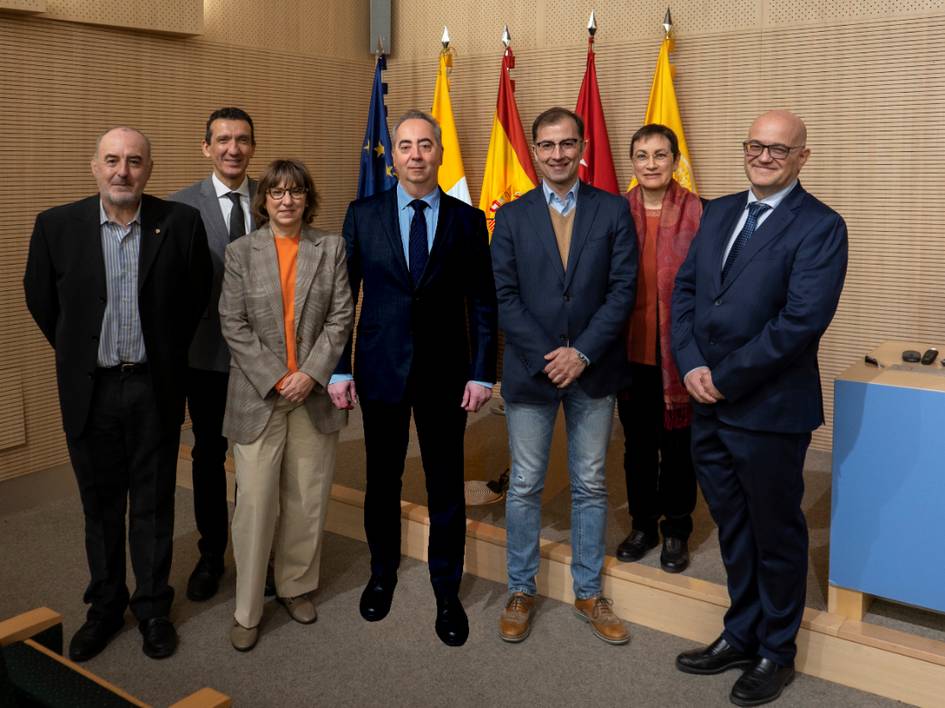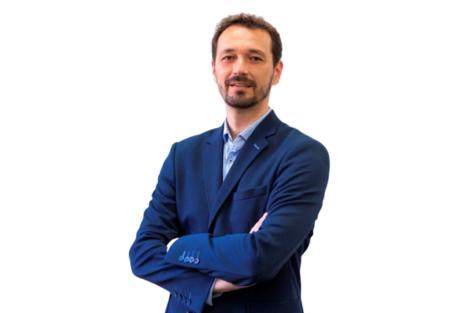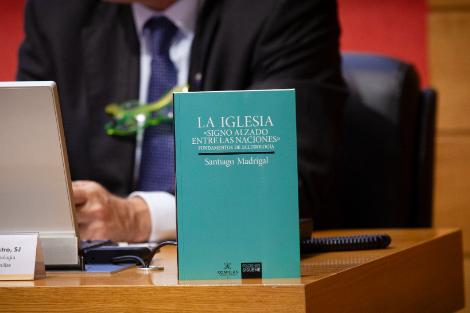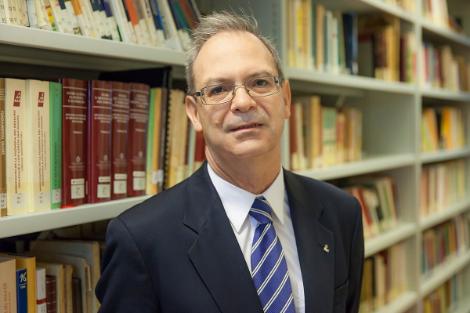Leaders in QS World University Rankings by Subject 2024: Theology, Divinity & Religious Studies
The Faculty of Theology ranks 1st in Spain and 29th internationally

The Dean with the Dean's Team of the Faculty of Theology
19 April 2024
The Faculty of Theology at Comillas Pontifical University maintains the first position among the Spanish Faculties of Theology in the QS World University Ranking by Subject 2024. Our Faculty of Theology also improves its international positioning, achieving 29th place and entering the top 30 in the world.
Francisco Ramírez, SJ, Dean of the Faculty of Theology, is delighted that the prestigious QS ranking has once again recognised the quality and prestige of our Faculty of Theology. "This ranking does not only measure objective elements, such as research, publications, etc.: it also relies on the opinions of academics from all over the world, whose very positive evaluations of us we should also be grateful for. As well as being a source of joy and satisfaction, this and other acknowledgements should stimulate us to continue on the path of work well done, in the depth and relevance of our theological production, in the quality and attractiveness of our teaching, in the service to the Church, insofar as theology is the mediator between faith and culture, between the Gospel and society. More than ever, in times of such accelerated cultural and social change as the one we live in, we are needed as theologians, biblical scholars, moralists, specialists in Church history or spirituality, to collaborate with other disciplines, in an interdisciplinary effort, in order to illuminate possible responses to current needs. As the Constitution Veritatis Gaudium points out, our Faculty of Theology should be like a 'laboratory', where new answers, well grounded in Tradition, but not merely repetitive, to the new searches and questions of our age, are thought out with investigative freedom and submitted for verification".
The Vice-Dean, Pedro F. Castelao, comments that "Being once again the No. 1 Faculty of Theology in Spain brings us, obviously, a very considerable satisfaction which, however, cannot make us fall into the temptation of pride or self-complacency. The increase in our academic reputation, as indicated by the QS 2024 Ranking, only makes sense if it drives us once again to continue to serve society and the Church better in the mission of making the essence of the Gospel truly meaningful in the current context. And for this we need to continue to build bridges of reflection and dialogue. A positive evaluation in a ranking is always welcome, but the commitment to the creation of a theology that seeks the truth and fosters a community of thought in freedom among teachers and students surpasses, in its ultimate aim, any kind of quantitative measurement. Celebrating this good news should not make us forget that all our efforts should be directed towards what really matters, which is not to shine in the spotlight, but to serve with silent work the knowledge of God and the tradition of the Church in today's society".
Carmen Márquez, Head of Studies at the Theology University for Postgraduates (TUP), affirms that "For the students of the TUP, mainly lay people who seek a foundation for their faith, it is very important to know that they are receiving a rigorous and quality formation. The recognition is a spur that encourages us to continue working to offer them teaching and theological reflection that helps them to think and live the faith in an increasingly complex world, that encourages them to inculturate the message of the Gospel in different contexts and enables them to carry out pastoral tasks in the Church. May the theological teaching and research of our Faculty be an instrument that helps to shape the face of a Church that goes out on mission, open to the peripheries, evangelising and evangelised, of which Pope Francis speaks to us".
The Director of the Department of Dogmatic and Fundamental Theology, Ángel Cordovilla, emphasises that "This is great news and a cause for joy. In these times of rankings, we should not be obsessed with them, but rather maintain the intrinsic quality of our research and teaching, of the life of our faculty, so that it can then be shown in the rankings, as it has been, knowing how to take advantage of our strengths and improve our weaknesses".
María Jesús F. Cordero, Director of the Department of Sacred Scripture and Church History, underlines that "it is an encouragement to see that the Faculty obtains good results in this field. I believe that the improvement in positions reflects the effort and quality of the faculty's work in teaching and research (academic reputation, citations, indexing). The Faculty of Theology has an important relevance in the life of the Church. The mere fact of coming to study here is already an important "ecclesial experience": it involves not only quality training, but also meeting fellow students from different continents, cultures, vocations and charisms, with an important presence from Latin America, but also from Africa and Asia. This enriches academic life and multiplies the Faculty's influence in other geographies. From the teaching staff, ecclesiality itself is an essential value, which is consciously and daily transmitted in teaching; also in the service given to the Church in many other ways, especially through participation and collaboration in training tasks and forums for reflection. The availability of the professors in this sense is remarkable: contributions in areas of formation of the dioceses, of consecrated life, of the EEC, are very common places of service from all disciplines".
Javier de la Torre, Director of the Department of Moral Theology and Praxis of Christian Life, emphasises that "Research in the department is taking an important leap forward on three fronts: many of the professors in the department are starting to work together (we have a joint project coming out in October on The spirit is poured out in fragility), some professors are working with research projects from other universities (some R&D) and much more work is being done with other centres within UNIJES (UNIJES bioethics has brought out several publications on ecology, coping with suffering, euthanasia in the last four years)".
The Director of the University Institute of Spirituality, Fernando Millán, emphasises that "For the University Institute of Spirituality it is a challenge, an invitation to continue making present in our society what Christian spirituality means, treated with theological and academic seriousness, open to dialogue with culture, with art, with the various spiritual traditions, both within the Catholic Church and other religions. Following the Ignatian spirit and inspiration, we thus open ourselves to the world by sharing what the spiritual dimension of our faith entails...".
Rafael Amo, Director of the Chair of Bioethics, points out that "The position that the Faculty of Theology of the University of Comillas occupies in the QS ranking helps to focus on the work that the Chair of Bioethics is constantly carrying out to offer current, quality research with an impact on society. Bioethics is a science that is advancing at breakneck speed, as it has to respond to the scientific advances and socio-health and public health problems that society faces on a daily basis. This position in the ranking helps us to know that we are on the right track, and that we must continue to carry out in-depth research and knowledge transfer work to help create a science with a conscience, and so that day-to-day bioethical problems in clinical care can be illuminated by the light of theological bioethics".
With an overall subject score of 74.6, the Faculty of Theology increases its academic reputation, as it does in citations and indexing from the previous QS World University Rankings by Subject 2023.
All the latest news from the Faculty of Theology can be found on the website, in the monthly newsletter and on the social network X (formerly Twitter).
Statistics
You may also be interested in

Professor Santiago G. Mourelo publishes this article on the itineraries of education in faith in the magazine Misión Joven, of Salesians

The posthumous work of the Professor, published by Publishing House Sígueme , was presented with a heartfelt tribute by professors and friends

Professor Gabino Uríbarri, SJ participated in the presentation of this book by Carlos María Galli
